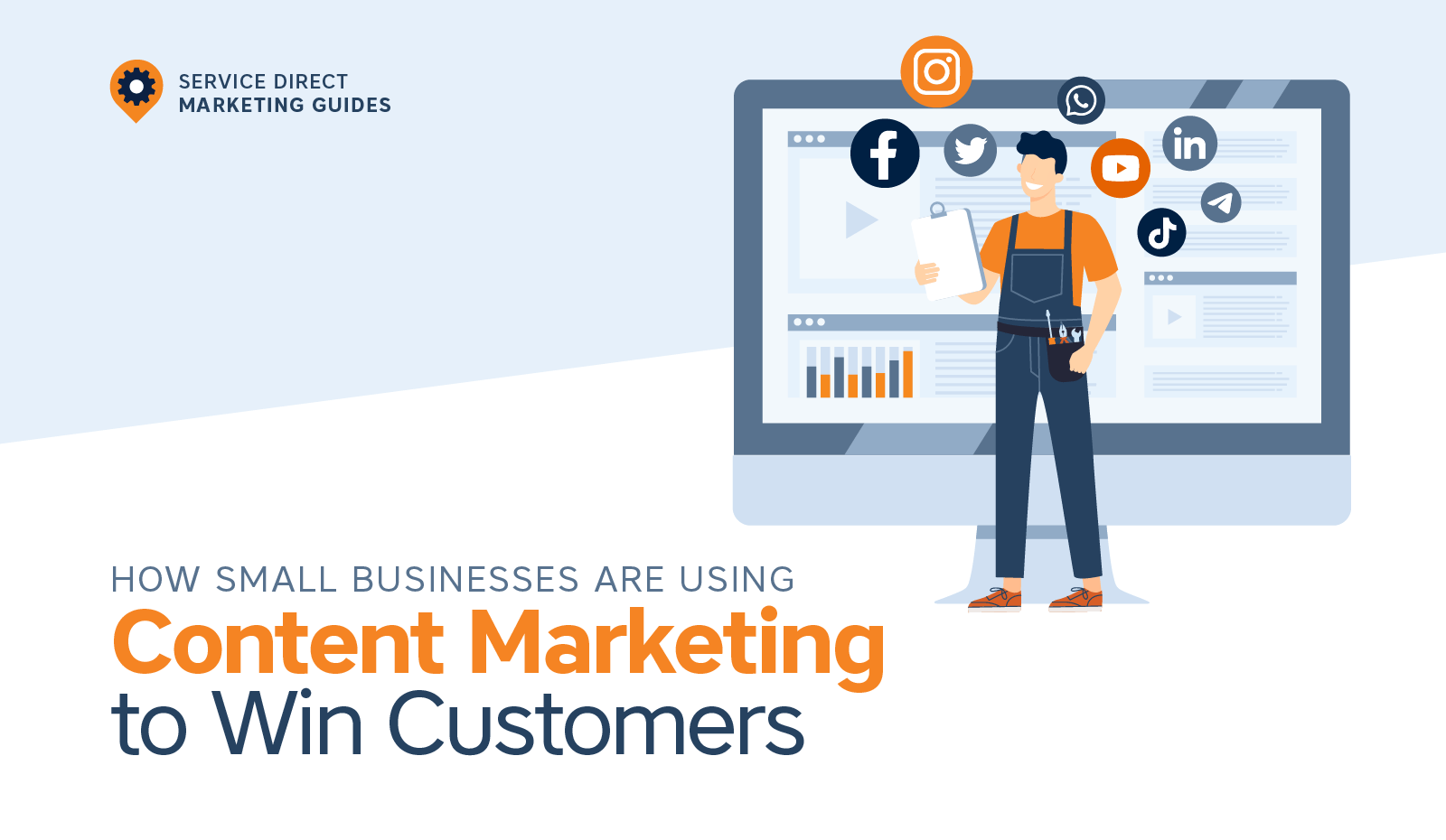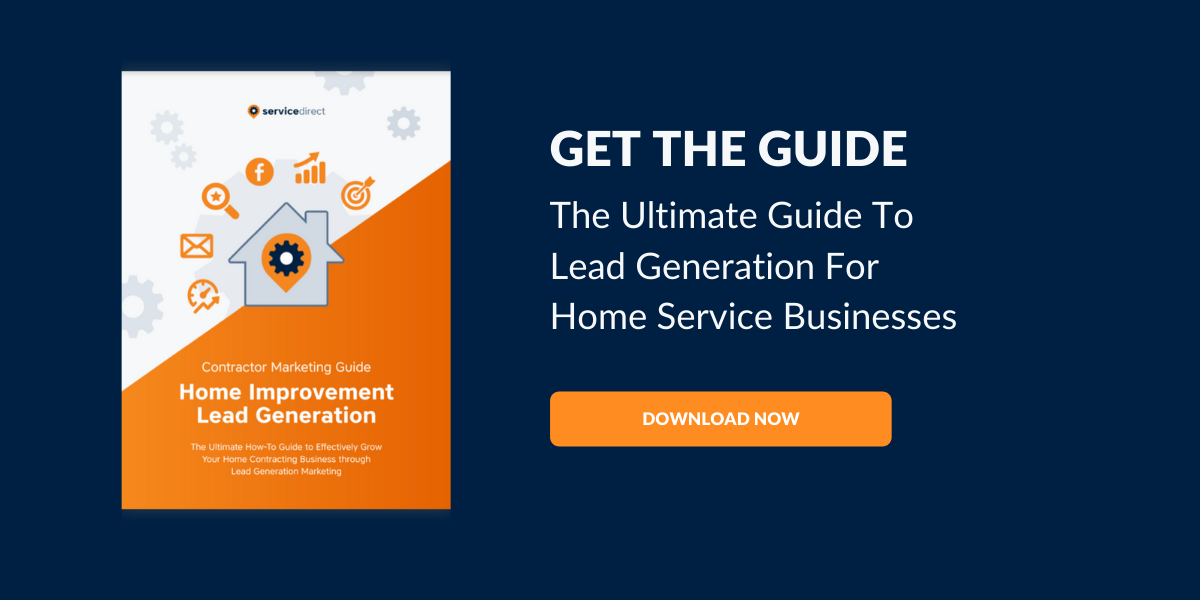How Small Businesses Are Using Content Marketing to Win Customers
In an age where digital landscapes evolve at a rapid pace, small businesses are faced with the challenge of standing out and capturing the attention of potential customers. Because of this constant evolution, traditional advertising methods are no longer the sole path to success.
Instead, a new era of marketing has emerged; one that prioritizes value, connection, and engagement. Welcome to the world of content marketing—a strategic approach that has redefined how small businesses can attract, engage, and ultimately win over customers.
What is Content Marketing?
If this is the first question that comes to mind when you hear the phrase “content marketing,” you’re not alone. According to a survey conducted by Service Direct, only 57% of small businesses implement content marketing in their business strategy.
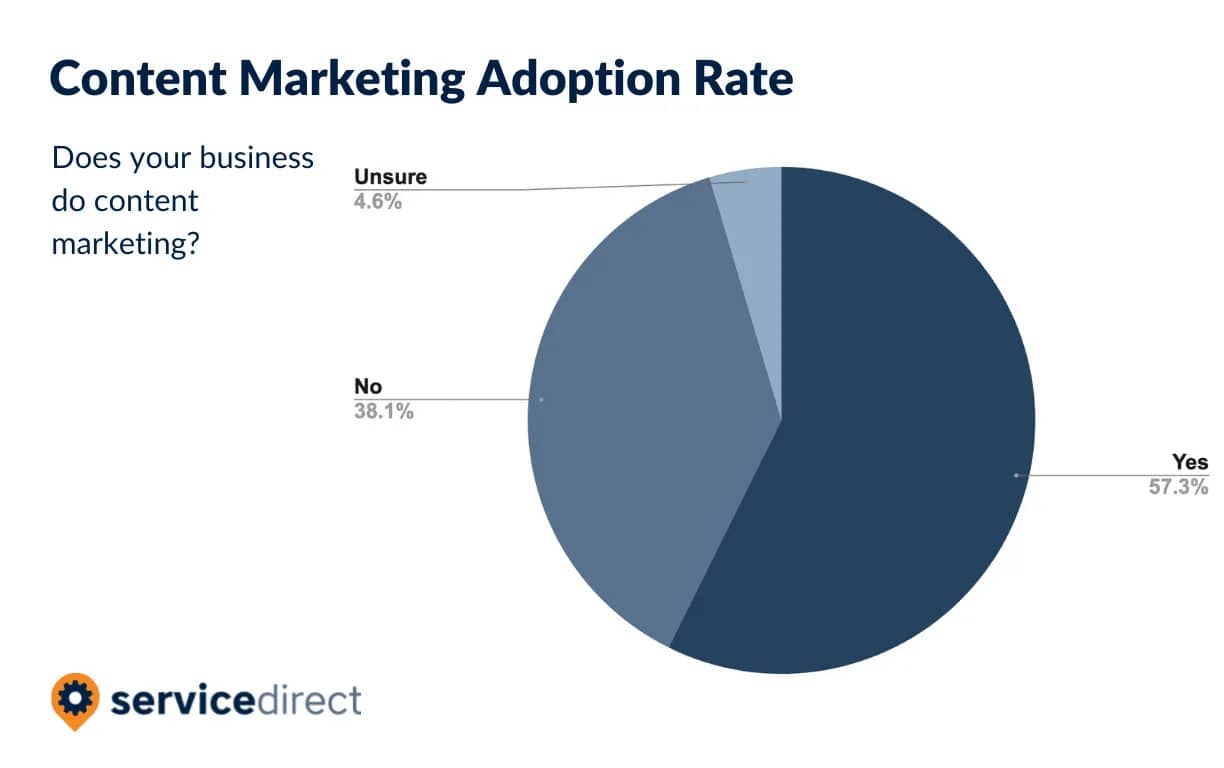
Put simply, content marketing is producing and publishing written and visual content online to increase brand visibility and engagement with customers.
But in today’s day and age, content marketing is about more than just pushing as much stuff out as you can. Instead, think of it as storytelling in the digital age. You need to have a why behind each piece of content that is created.
So rather than bombarding people with ads, small businesses should share valuable, relevant content that informs, entertains, or solves problems. It's about giving, not just selling.
The "Why" Behind Content Marketing
Content marketing has emerged as a beacon of authenticity and value. But why is this approach garnering so much attention, and why should small businesses embrace it?
Let's dive into the compelling reasons behind the rise of content marketing:
-
Building Trust and Credibility: Content marketing educates and builds trust by providing valuable information, setting your brand apart from aggressive advertising.
-
Nurturing Relationships: Regularly sharing content creates meaningful connections with your audience, encouraging repeat interactions and engagement.
-
Enhancing Brand Awareness: Quality content boosts brand visibility, positioning your business as an industry resource and increasing recognition.
-
Supporting SEO Efforts: Relevant content improves search engine rankings, driving organic traffic and expanding your online presence.
-
Cost-Effective Marketing: Done right, content marketing offers a budget-friendly alternative to traditional advertising, yielding significant long-term returns.
Content marketing is more than a trend; it's a philosophy that puts the audience first. By providing value, building relationships, and addressing customer needs, you can foster a deeper connection between your business and potential customers.
Identifying Your Audience
A crucial and often overlooked first step in the content marketing journey is pinpointing your target audience. This initial step is pivotal because it sets the tone for your entire strategy.
Understanding your audience is like unlocking the secret to crafting content that truly connects. When you tailor your content to a specific audience persona, it resonates on a personal level, encouraging engagement and interaction.
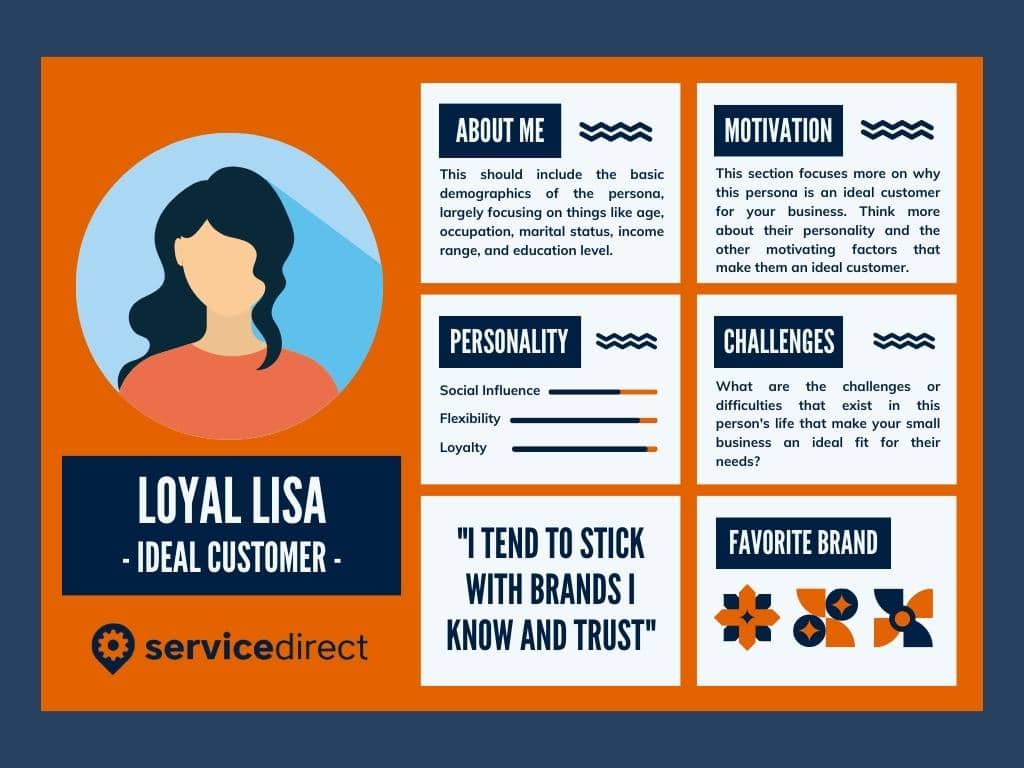
This precision allows you to ensure your time and budget are being used efficiently by focusing on people most likely to convert, rather than casting a broad net.
Moreover, when your content speaks directly to your audience's concerns or offers solutions they seek, it establishes your brand as a trusted source of information. This not only engages your audience but also differentiates you from competitors who might not be catering to those unique needs.
By knowing your audience inside out, you can shape your content marketing efforts strategically.
Knowing your audience ensures you're consistently delivering value where it matters most. As your business evolves, this understanding also allows you to adapt your strategy and content to stay in sync with your audience's changing preferences and demographics.
In a nutshell, identifying your audience is the guiding star that directs your content marketing toward meaningful engagement, lasting relationships, and successful business growth.
Content Marketing Budget & Plan
One of the reasons why content marketing is a successful strategy for many small businesses is that it tends to be more cost-effective than traditional advertising. Done well, content marketing provides opportunities to deliver substantial returns without significant financial investments.
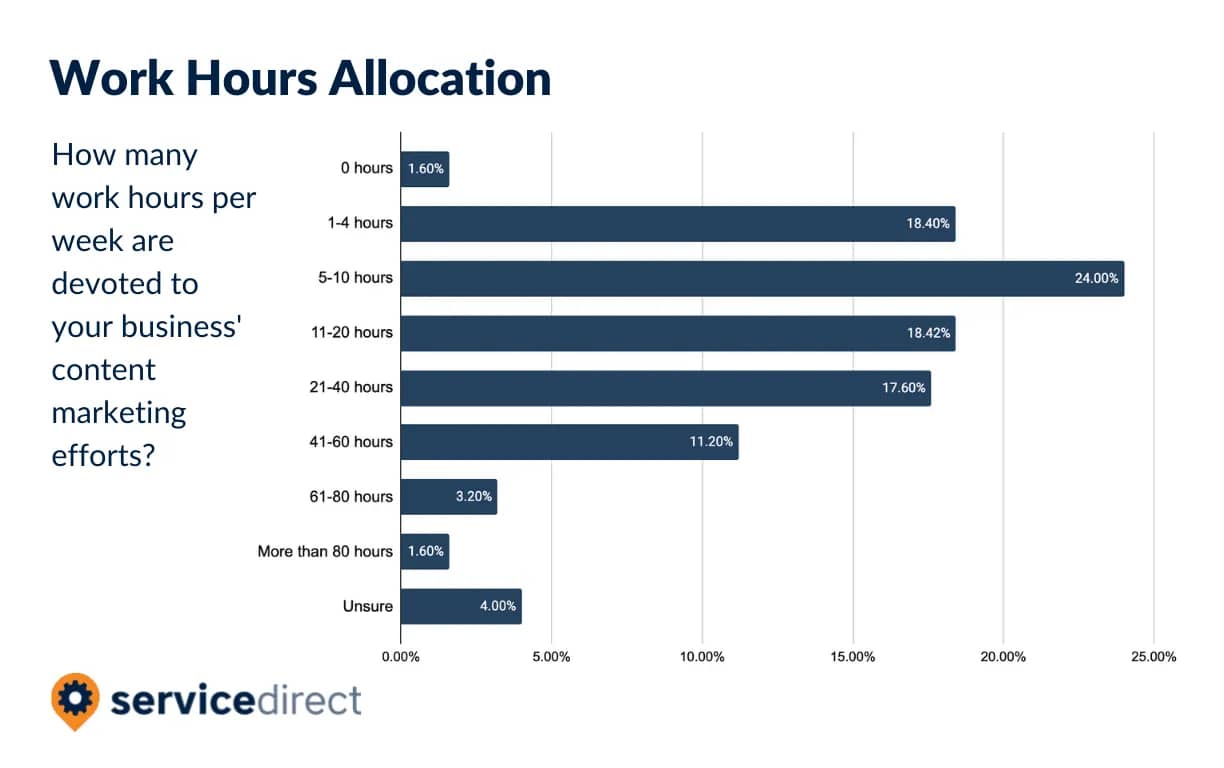
Formulating a budget within your content marketing strategy is a strategic move that ensures resources are utilized efficiently. It allows you to allocate funds according to your priorities, maintaining consistency in content production, distribution, and analysis.
As your content strategy evolves, your budget can adapt, ensuring that you capitalize on successful initiatives and refine strategies that need improvement.
In essence, a realistic and adaptable budget is a powerful tool that balances your investment with the remarkable potential for customer engagement and business growth that content marketing provides.
Content Marketing Plan
In our survey, we found that only 61% of small businesses reported having a documented content marketing plan. We also found that there was a strong correlation between the likelihood of success with content marketing and the presence of a documented plan.
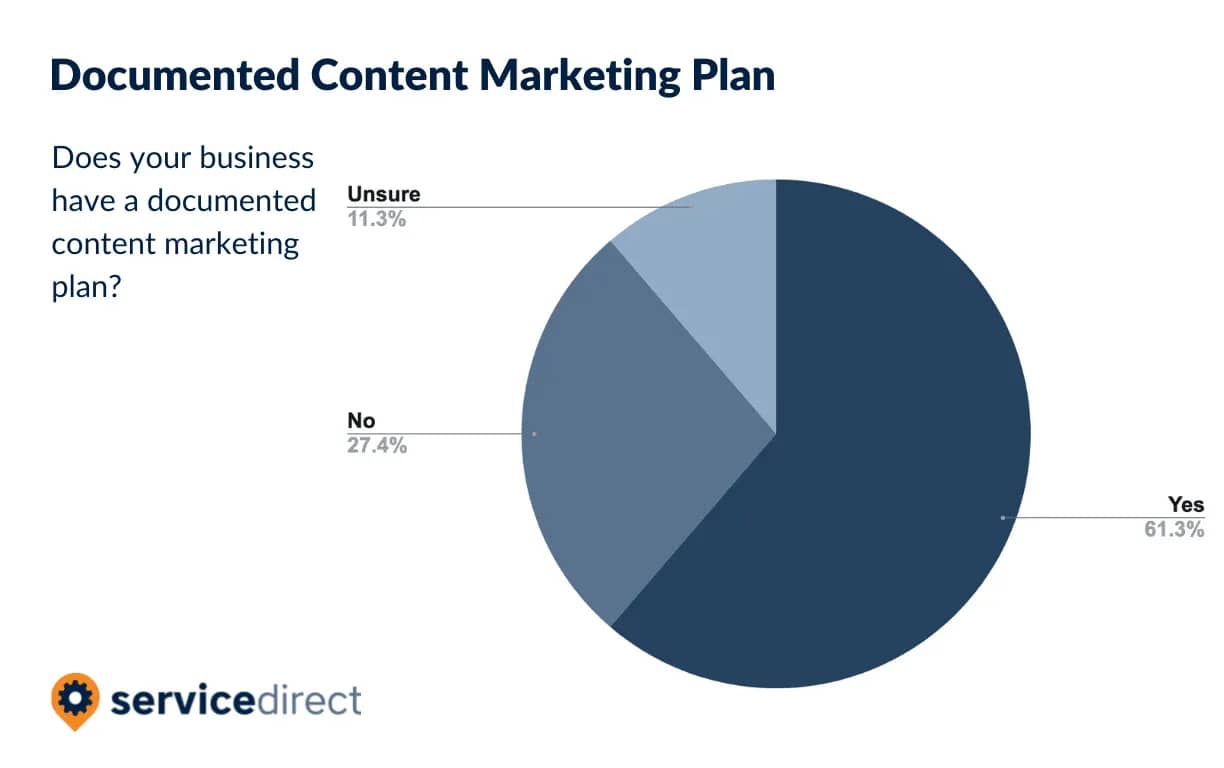
Clearly, having a content marketing plan is crucial to seeing high levels of success with the marketing strategy. This is largely because it provides a strategic roadmap that aligns your efforts, ensuring consistent and purposeful content creation.
This not only maximizes your impact in reaching and resonating with your target audience but also enables you to effectively use that budget we were just talking about.
In short, a documented content marketing plan is critical to long-term success.
Keywords, Content, And SEO
Keywords are the language of the digital landscape. They enable your content to be found by users actively searching for information related to your industry, products, or services.
By strategically incorporating relevant keywords into your content marketing strategy, you increase the likelihood of your website appearing in search engine results, which drives organic traffic and helps expand your online presence.
Keyword-rich content not only optimizes your content for search engines but also provides value to your audience.
When users search for specific terms, they are seeking solutions or information, and by catering to these queries, you position yourself as a knowledgeable and valuable resource. Well-crafted content that addresses their questions and concerns not only captures their attention but also establishes your credibility and expertise in the field.
Furthermore, keywords serve as a bridge between your content and your target audience. By understanding the keywords your audience uses, you gain valuable insights that allow you to tailor your content to resonate with your audience.
And while finding the right keywords might seem daunting, there are a ton of great SEO tools out there that can help you. Google Keyword Planner is a fantastic free tool that will help get your keyword research journey started.
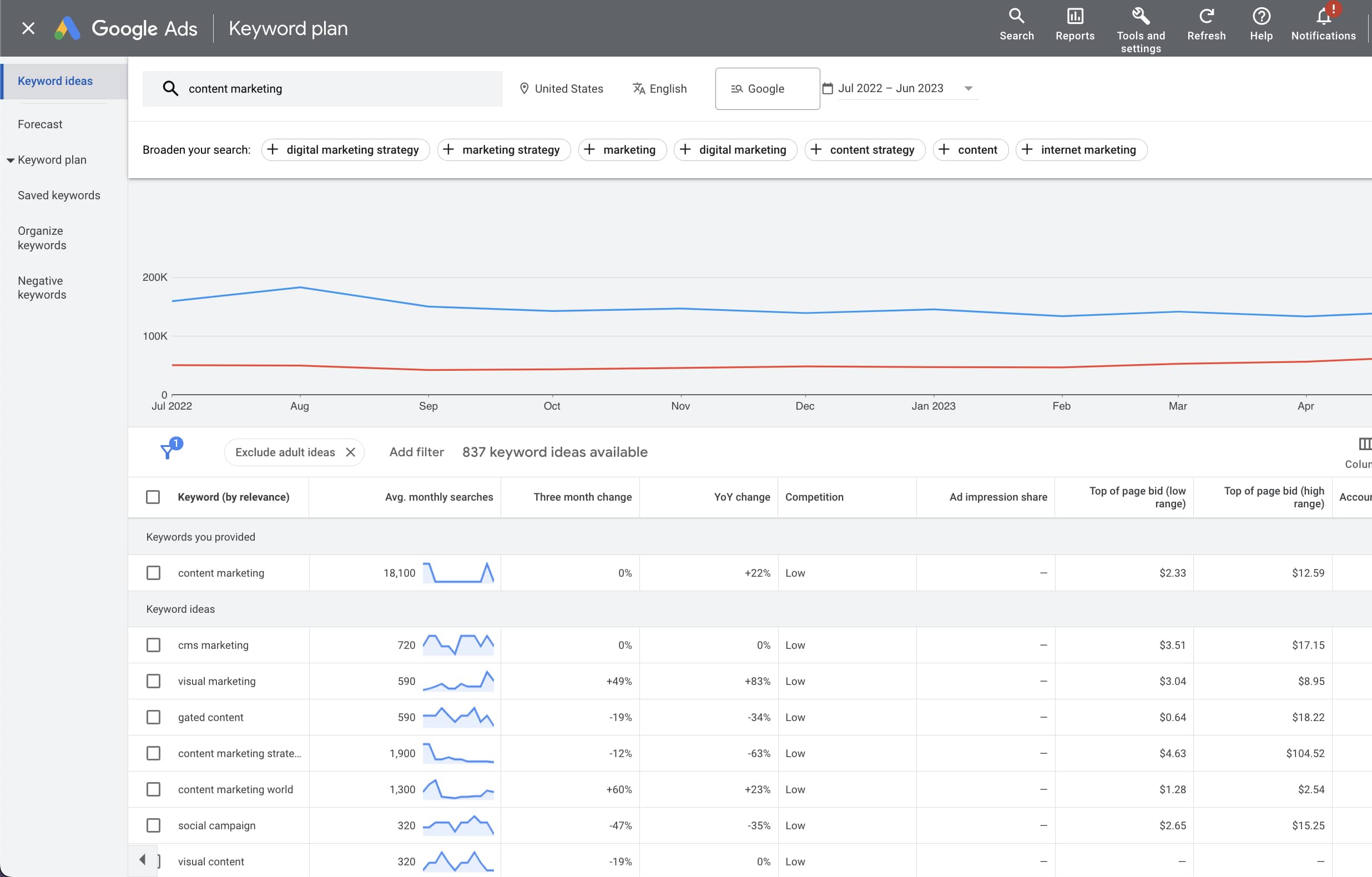
Remember, it’s crucial to strike a balance between keyword optimization and natural, valuable content. Search engines have become sophisticated in recognizing genuine content that provides value versus content that is merely stuffed with keywords.
Crafting high-quality, engaging content that incorporates keywords seamlessly ensures that you're not only appealing to search engines but are also delivering meaningful content that captivates your audience.
Reusing Your Content
Turns out recycling isn’t just for glass, paper, and plastics! With content marketing, you can breathe new life into old content to help boost your strategy while maximizing time and resources.
By reimagining and repackaging previously created content, you can maximize your ROI with content marketing. Transforming a blog post into a podcast episode or reshaping a video into an infographic opens the door to fresh engagement opportunities without starting from scratch.
Beyond financial gains, repurposing content widens the scope to reach new audiences by catering to varying preferences through diverse formats.
The essence of repurposing lies in refreshing relevance. While the core ideas may remain timeless, revamping older content with updated insights ensures its continued value and credibility. Moreover, repurposing can offer significant Search Engine Optimization advantages by targeting new keywords, boosting discoverability, and amplifying organic traffic.
Ultimately, embracing the art of repurposing content affords you the ability to optimize existing resources, while allowing for the addition of new, relevant perspectives.
Using AI to Aid In the Content Marketing Process
Artificial Intelligence (AI) has emerged as a game-changing ally for small businesses in revolutionizing their content marketing strategy across various fronts. From content creation to analysis and optimization, AI offers a range of capabilities that enhance efficiency, effectiveness, and overall success.
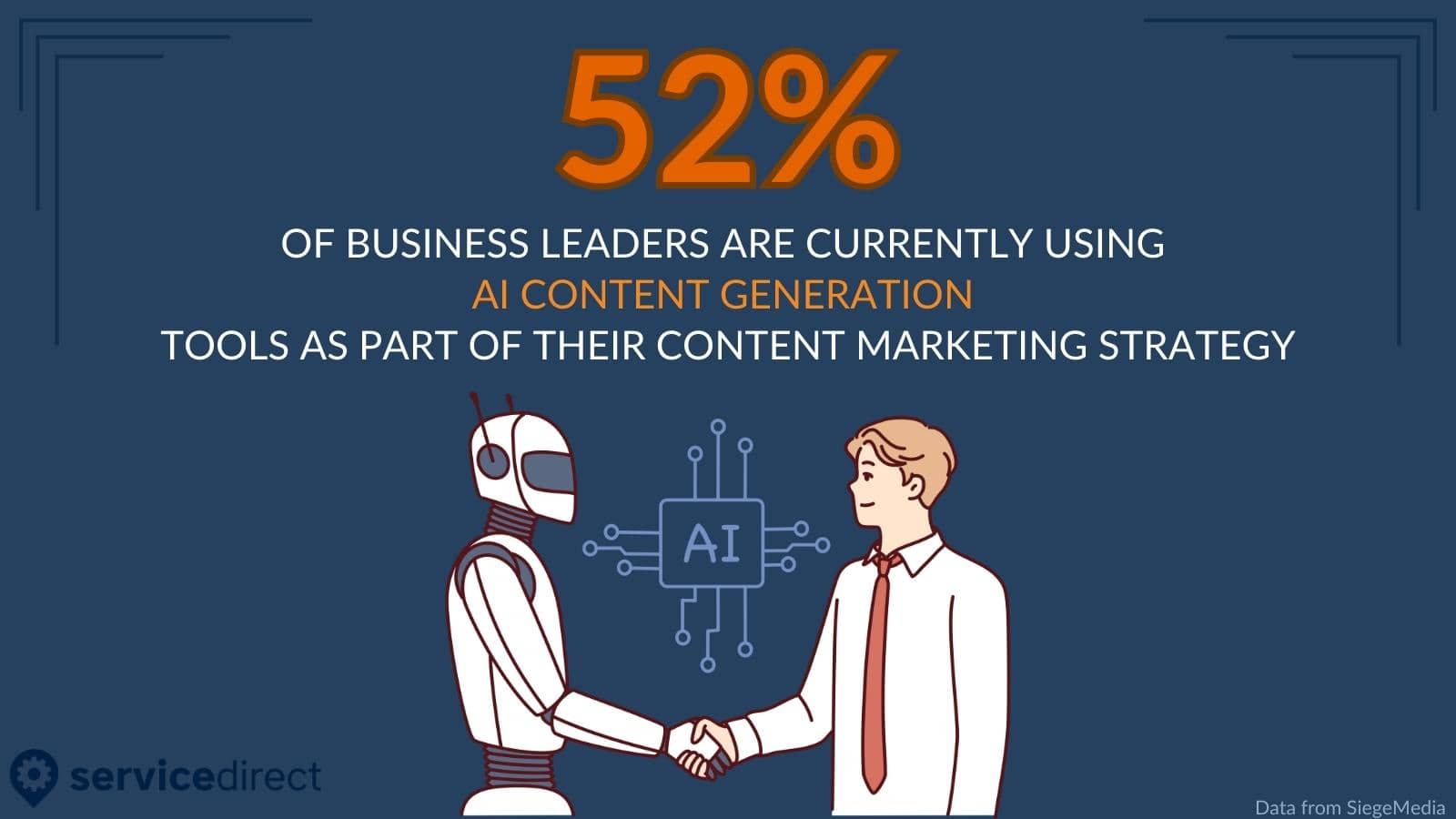
These are a few of the ways AI can aid you in your content marketing journey:
-
Content Creation: AI can generate tailored content, saving you valuable time and resources. Whether it’s blog posts, product descriptions, or image captions, AI’s content creation capabilities are vast.
-
Data Analysis and Insights: AI can help process data for content performance insights. This will help you understand what content resonates, which channels work best, and predict trends, informing strategy adjustments.
-
SEO and Keyword Optimization: AI can help with keyword research, identifying relevant terms, and analyzing competitors.
-
Content Distribution and Engagement: AI automates content distribution, optimizes posting times, and personalizes messages, boosting engagement. AI chatbots can offer 24/7 customer support, improving user experience.
-
Social Media Strategy: AI can help manage social media by scheduling posts, analyzing engagement patterns, and suggesting new content.
-
Predictive Analysis and Optimization: AI can attempt to predict market trends and behavior, guiding content strategies for future success.
While artificial intelligence may seem intimidating to some and even frightening to others, it is a powerful tool that is changing the way we think about content production. Thanks to AI, small businesses with limited resources (like Service Direct) are able to focus more on ideation and engagement rather than churning out content.
However, it’s important to remember that while AI offers remarkable support in content marketing, success still requires human oversight and creativity. You must actively guide AI tools, ensuring that they align with your brand's unique voice, goals, and values.
Common Types of Content Small Businesses Create
In order to stand out with your content marketing, it’s crucial to have a versatile toolkit. Utilizing various types of content will allow you to engage, inform, and connect with different audience personas.
Let's explore some of the most impactful content types that small businesses are harnessing.
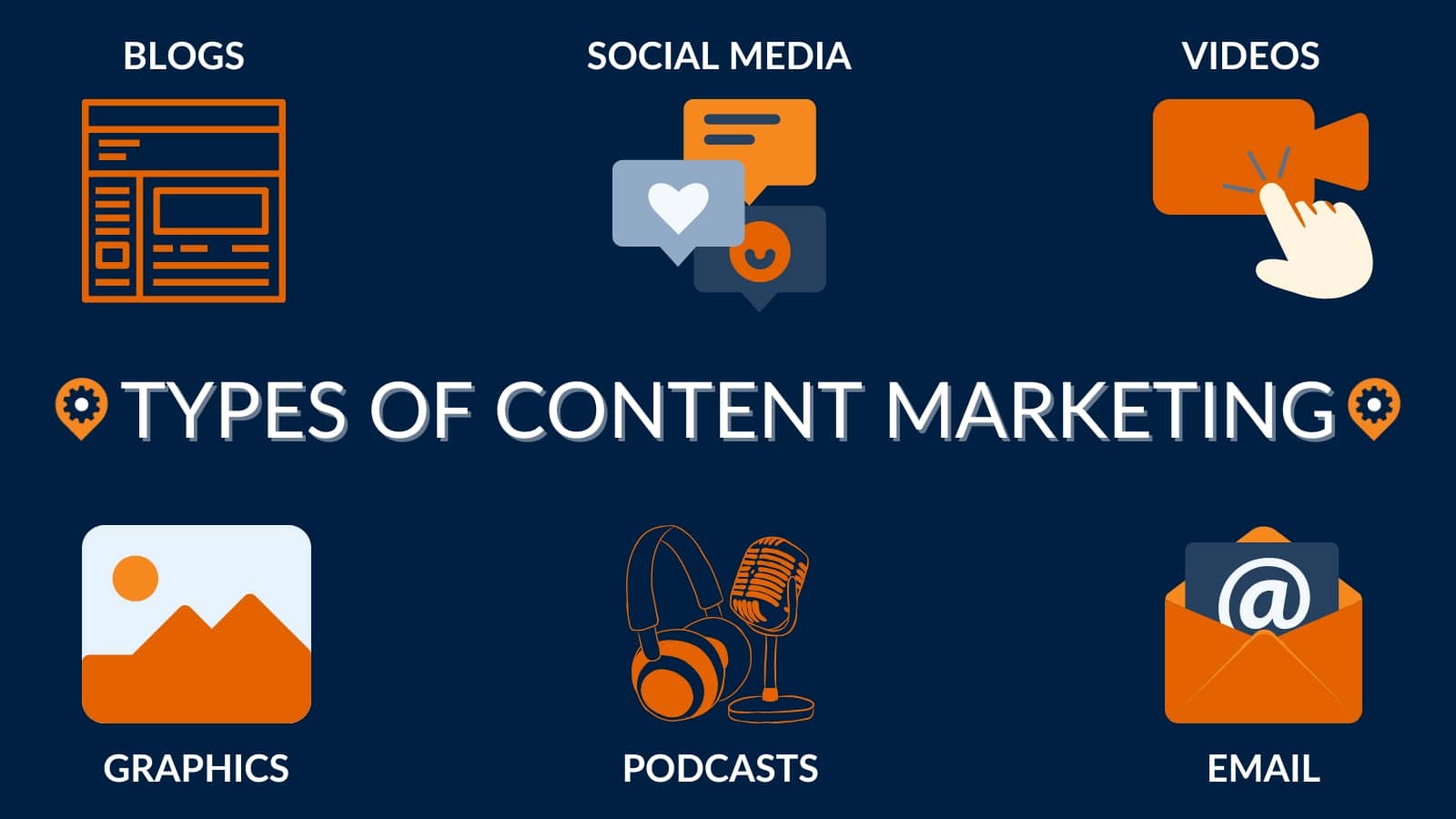
Blogs
Blogs remain a staple for small businesses to showcase expertise and provide valuable information. Through well-crafted articles, you can address customer pain points, offer solutions, and establish yourself as a thought leader in your industry.
Social Media
Social media platforms offer a direct line of communication to engage and interact with your desired audience. You can utilize platforms like Facebook, TikTok, Instagram, Twitter, and LinkedIn to share updates and connect on a more personal level.
Video
Video content has surged in popularity, in large part due to younger generations’ engagement on TikTok. From product demonstrations to behind-the-scenes glimpses, videos engage customers on an emotional level and can be shared across many platforms.
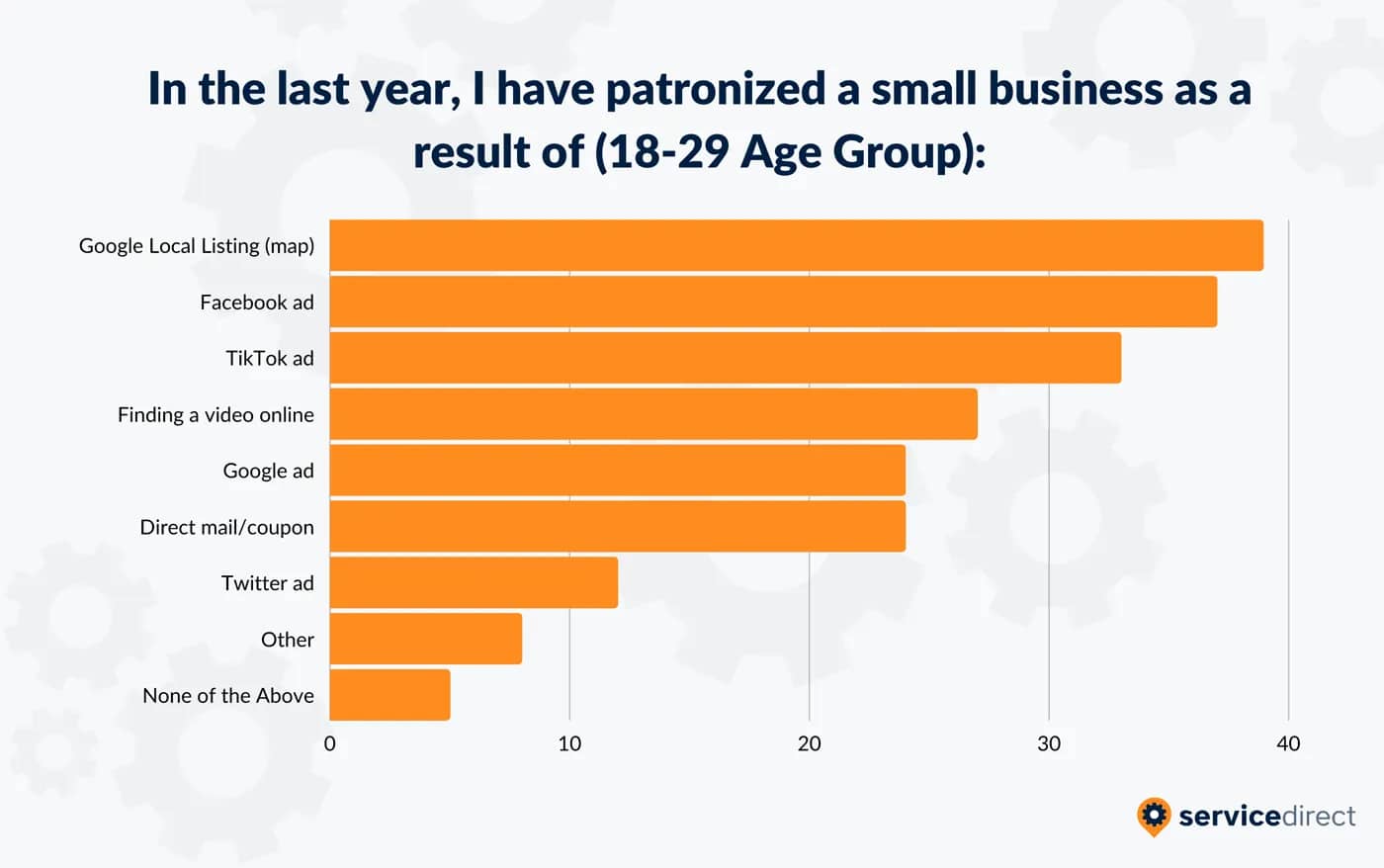
Graphics
Infographics, illustrations, and other visual content capture attention quickly. Graphics distill complex information into easy-to-digest visuals, making them effective tools for explaining concepts, presenting data, and enhancing engagement on various platforms.
Podcasts
Podcasts have emerged as a unique way to engage with potential customers while sharing your expertise. Businesses can host discussions, interviews, or educational sessions, tapping into the growing video podcast listener base.
Email marketing remains a key channel to engage with existing and potential customers in a 1 on 1 format. You can craft personalized messages, share updates, offer exclusive content, and nurture relationships through targeted email campaigns.
In Conclusion
In the realm of small business digital marketing, content continues to shine as a critical way of engaging with potential customers authentically and affordably. By embracing content creation that resonates with your audience's needs, you can craft a brand identity that stands out in a crowded digital space.
From the dynamic potential of videos to the critical use of keyword research, a well-rounded content strategy empowers you to not only win customers but also foster connections that propel growth and success in the ever-evolving digital landscape.

